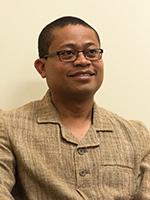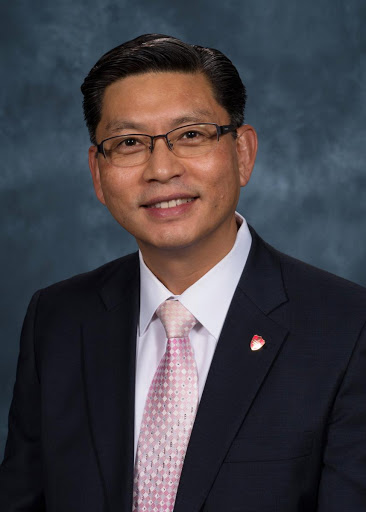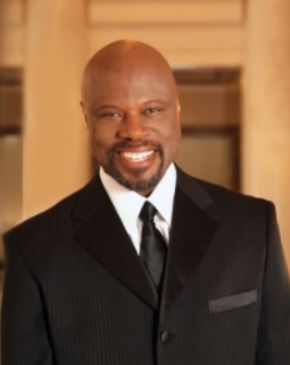
Congress on Social Justice
About Speakers
 |
Akintayo Odeyemi |
Akintayo “Tayo” Odeyemi has been an active player in the community development industry for more than a quarter century, serving most recently as executive director in the ADRA Africa Regional Office, with initial responsibilities of Programs and Planning director as well as emergency management and strategic planning. He holds a doctorate in Agricultural Extension and Rural Sociology from Obafemi Awolowo University in Nigeria. During his years of service, he has also labored in Nigeria, Malawi and Kenya. |
 |
Cristian Dumitrescu |
Cristian Dumitrescu teaches World Mission and Intercultural Studies and Research at the Adventist International Institute of Advanced Studies (AIIAS) in the Philippines. He is the editor for the Journal of Asia Adventist Seminary, and a regional editor for the Journal of Adventist Mission Studies. Cristian was born in the beautiful country of Romania, during the time of Communism. He grew up learning early in his life how to cope with challenges and experienced religious persecution. Cristian spent several decades studying current social issues such as the immigration phenomenon in Europe and Asia, the case of the invisible children in China, people being trafficked especially for sex and forced labor across borders, and the impact of particular worldviews and values on the way to communicate the gospel especially in shame and honor cultures. This passion was born during his ministry with nomadic Gypsies in Romania, as well as with children with disabilities and marginalized people. |
 |
Hyveth Williams |
Christians, especially Seventh-day Adventists, are generally suspicious of the term, social justice. The reason for such a quandary and controversy is because social and justice are often just catch phrases that oscillate in and out of favor. The result is that the concept of social justice often suffers from competing definitions and vastly different interpretations. Therefore, preaching social justice has become a polarizing proposition because people seem to readily conclude the sermon will focus on inconvenient truths about systemic racism. Few consider that although addressing systemic evil is an unequivocal part of social justice, the gospel requires a broader perspective which includes the Golden Rule in Matthew 7:12 and the prophetic word in Micah 6:8. For, as Jesus admonished His disciples then and now, preaching must be concerned with the spiritual and not neglect “the more important matters of the law - justice, mercy and faithfulness” (Matt. 23:23). This paper will discuss the broader definition of the topic in the context of an ever-changing world, dominated by instantaneous communication, environmental challenge, technological innovation, and social upheaval that have redefined the meaning of social justice. Various methods and styles of preaching will be discussed, concluding with a demonstration of the prophetic preaching of social justice. |
 |
Ingram London The Contours of Ellen White’s Embryonic Adventist Black Liberation Theology, 1844–1899 |
IJames Cone, the academic father of what is termed Black Theology, launched the theological discipline in 1969 with his seminal work Black Theology and Black Power. However, the appearance of Black Theology in terms of its themes, contents, and conclusions are much older than Cone’s first articulation of the discipline and can be traced throughout the history of African-American religious thought, something that Cone acknowledges. Interestingly, the major themes of Black Theology can also be found in the work of the ethnically Caucasian, Seventh-day Adventist Prophetess Ellen G. White, whose writings between the years of 1844–1899 contain a nascent Adventist Black Theology touching on all three of its major themes including: Black Liberation, Black Theodicy, and Black Dignity while integrating these themes with the pillar doctrines and metanarrative of Seventh-day Adventism. This paper is the result of a comprehensive thematic analysis of Ellen White’s in search of: (1) any elements of Black Theology in the Ellen White corpus as well as (2) how she may have integrated Black Theology themes with her Adventist worldview. The findings of this research point towards the existence of a promising, nascent, Adventist Black Liberation Theology within the pre-1900 writings of Ellen White. The research findings demonstrate Ellen White’s belief in: (1) Christ’s ultimate eschatological liberation of Black people from oppression, (2) God’s active role in liberating Blacks from American chattel slavery, (3) the satanic origins of systematic oppression against Blacks, and (4) the Christian church’s obligation to ensure the ongoing economic, educational, and religious freedom of Black people. This research points to a basic compatibility between the notions of Black Theology and Adventist Theology, and warrants the further development of an Adventist Black Theology, while avoiding the possible hermeneutical and methodological pitfalls of certain strands of Black Theology as an academic discipline. |
 |
Kenley Hall |
Ellen G. White began her prophetic ministry at a time when the question of slavery and its continued existence and/or expansion was foremost on the national agenda. The issues relating to slavery would heat up even further in 1850 with the passage of the “Fugitive Slave Act” and the failed slave insurrection led by John Brown at Harper’s Ferry in 1859. Ultimately these tensions would lead to the outbreak of the Civil War in 1861. Ellen G. White would use her prophetic office to respond to this pressing social justice issue. This paper will explore the prophetic voice of Ellen G. White in regard to slavery, the Fugitive Slave Act, John Brown and Harpers Ferry and the Civil War. It will show that she articulated a position that went much further than many anti-slavery advocates were willing to go. Her prophetic utterances reveal that she was a radical abolitionist. She was not merely opposed to the expansion of slavery she was opposed to its very existence. Additionally, she was in opposition to the colonization plan of mainstream abolitionist and instead championed emancipation of slaves as free and equal Americans. |
 |
Michael Campbell Social Justice, Adventism, and Fundamentalism |
Michael Campbell teaches church history and theology at Southwestern Adventist University in Keene, Texas. He earned a bachelor’s degree in history and theology from Southern Adventist University and a master’s degree and doctorate from Andrews University. He is married to Heidi, and they have two children, Emma and David. |
 |
Nicholas Miller - A Biblical View of Politics and Social Justice. | Nicholas Miller received his J.D. from Columbia University Law School, and also has a Ph.D. in American Religious and Legal History from the University of Notre Dame. Dr. Miller has argued many church/state cases in state and federal courts, has appeared before the U.S. Supreme Court in the case of Mitchell v. Helms, and is the author of more than thirty scholarly and professional journal articles and book chapters dealing with issues of church, state, and society. |
 |
Jiri Moskala |
Jiri Moskala is dean and professor of Old Testament exegesis and theology at the Seventh-day Adventist Theological Seminary at Andrews University. He joined the faculty in 1999. Prior to coming to Andrews, Moskala served in various capacities (ordained pastor, administrator, teacher and principal) in the Czech Republic. He is a member of different theological societies and has authored or edited a number of articles and books in the Czech and English languages. In addition, he has participated in several archaeological expeditions in Tell Jalul, Jordan. |
 |
Joel Raveloharimisy |
Joel Raveloharimisy's life goal is to alleviate poverty in Madagascar. To this end, from 1999 to 2007 he raised funds to construct over 300 classrooms and school buildings and numerous churches throughout rural and urban Madagascar. Between 2003 and 2011, he also helped to establish the first ophthalmological clinic and education center in the country. In 2003, he started Actions for Madagascar, a group of dedicated students and young professionals with a goal of creating positive and sustainable changes in Madagascar by empowering youth and women, advocacy and community development. The team designs and implements activities that assist less fortunate families, women and young people with starting small businesses in both rural and urban areas. |
 |
Jochebed Ade-Oshifogun - Health Disparities and Social Justice |
Dr. Bea Ade-Oshifogun is an Endowed Nursing Chair at Andrews University, Berrien Springs, Michigan, USA. She completed her nursing Ph.D. at the University of Chicago, Illinois. She has more than 30 years of clinical and nursing education experience working in Africa, Europe, and the United States. Her research foci are educational environment assessment, nutrition & obesity, and culture & diversity. She has authored manuscripts in scholarly journals and has presented her research findings at several international scientific conferences. Dr. Ade-Oshifogun presently holds certifications for Nursing Education (CNE) and Nursing Informatics (RN-BC). While in Nigeria, Dr. Ade-Oshifogun worked with the West Nigerian Mission to set up clinics and health centers in rural areas of West Nigeria and worked as a literature evangelist for four years. She holds Nigerian Midwifery and Public Health certifications. She taught and prepared students for a minor in Health Studies at the Adventist Seminary of West Africa, Nigeria. In the United Kingdom, Dr. Ade-Oshifogun worked in various nursing disciplines, including Surgical, Medical, Ear Nose & Throat, Intensive Care, Mother-Baby, and Orthopedic units. She also taught students at Newbold College, England. She enjoys research, singing, and evangelism. |
 |
Melissa Ponce |
This proposal is for a paper that takes a look at the topic of Ellen G. White and Adventist History to establish a baseline for a very activist stance by the Adventist pioneers about social justice. This paper then focuses most of how Seventh-day Adventism reversed its stance on social justice with its encounter with Fundamentalism during the early twentieth century, eroding Adventism’s progressive stance on social issues and mirroring the Fundamentalist antipathy (based out of their suspicion) of social justice as a ploy of Modernist Christianity. This paper furthermore argues that as Adventism became increasingly Fundamentalist, particularly during the Inter-War period (between World War I and World War II) that Adventism reversed its historic and progressive stances in terms of both race and gender. Early Adventist women who served in prominent roles in the church and in ministry (including as successful evangelists) became marginalized and by the end of the 1920s there were hardly any women in ministry (the notable exceptions being overseas in mission fields). Similarly, early Adventists who were ardent abolitionists, by the early twentieth century became increasingly bifurcated embracing segregation—some white Adventists even openly embracing the Ku Klux Klan. This paper probes through historical analysis these contours with pertinent analysis about what this means for Adventism today. |
 |
Robert Osei-Bonsu Homiletics and Social Justice |
The centrality of the pulpit in Protestant kerygmatization offers an excellent model for the proclamation of social justice. In His inaugural sermon of Luke 4:18-19, Jesus Christ quotes Isaiah 61:1-2; and in doing so, He asserts the fulfillment of that prophetic oration with His earthly life and ministry. The setting of Jesus’ assertion is homiletical and gives insight into how the pulpit may be used to advance social justice issues. The issue of social justice abounds in contemporary settings as much as they abounded back then in Isaiah’s and Jesus’ day. The present study explores the Jesus Model of mediating social justice from a local Ghanaian context. The same elements mentioned in the passage exist today; notably poverty, oppression, modern-day slavery, and health challenges. The paper argues that the exalted position of the pulpit makes it a channel of power for mediating contemporary social justice issues and preaching the acceptable year of the Lord to Ghanaians—and by extension, others as well. |
|
|
Remwil Tornalejo |
Discussions on Christian ethics revolve around issues such as abortion, biomedical issues, divorce and remarriage, and homosexuality. The ethical and moral responsibility of Christians toward the physical world has not been given much attention. However, during the turn of the twentieth century, more Christians have become involved in environmental discussions with the cognizance that how we relate to our natural environment has ethical and moral implications. Moreover, the insinuations of Lynn White that the Judeo-Christian tradition of humanity’s supremacy over nature has been the primary root of environmental degradation has elicited varied responses, but led many Christians to reexamine how one should relate to the environment. Concerns for environmental justice and discussions are built upon the framework of political persuasions, secular, materialistic, naturalistic worldviews, and even on non-Christian religious beliefs. Notwithstanding this milieu, the objective of this study is to promote environmental justice and creation care through building an awareness upon Christians of their moral and ethical obligation toward the natural world. This study attempts to do environmental theology based on the biblical framework that we are stewards of God’s creation. |
 |
Roy Gane |
This paper surveys Pentateuchal laws relevant to social power and distribution of resources and addresses the potential for applying their principles within the modern world. The goal of social justice in biblical law is not to overturn the existing social order but to preserve pre-existing privileges of individuals within their respective socioeconomic statuses. Thus, laws protect and aid persons who are vulnerable, including those who have suffered loss of status. Biblical law fosters a society in which people enjoy fair representation and have access to resources with which to independently support themselves. Social justice is based on ethical values that must be accepted as part of the collective world view; it is not enough to legislate and enforce them. |
 |
Solomon Appiah |
The centrality of the pulpit in Protestant kerygmatization offers an excellent model for the proclamation of social justice. In His inaugural sermon of Luke 4:18-19, Jesus Christ quotes Isaiah 61:1-2; and in doing so, He asserts the fulfillment of that prophetic oration with His earthly life and ministry. The setting of Jesus’ assertion is homiletical and gives insight into how the pulpit may be used to advance social justice issues. The issue of social justice abounds in contemporary settings as much as they abounded back then in Isaiah’s and Jesus’ day. The present study explores the Jesus Model of mediating social justice from a local Ghanaian context. The same elements mentioned in the passage exist today; notably poverty, oppression, modern-day slavery, and health challenges. The paper argues that the exalted position of the pulpit makes it a channel of power for mediating contemporary social justice issues and preaching the acceptable year of the Lord to Ghanaians—and by extension, others as well. |
 |
Sung Kwon Restorative Justice |
Sung Kwon is the former executive director of the North American Division Adventist Community Services (ACS); he served over 20 years and is an ordained minister of the Seventh-day Adventist Church. Though he grew up in a family with Buddhist and Catholic beliefs, he became a baptized member of the Seventh-day Adventist Church in 1991. While serving at NAD ACS, he has challenged the social justice dimensions of holistic engagement from charity to restorative justice; and expanded the scope of ACS services from relief to individual/community development and structural change/advocacy. |
 |
Wintley Phipps Shabbat speaker |
Wintley Augustus Phipps is a Trinidadian-American singer, songwriter, record producer, minister and founder of the U.S. Dream Academy, Songs of Freedom Publishing Company, and Coral Records Recording Company. He features a booming baritone voice, usually singing inspirational gospel music. He is an ordained Seventh-day Adventist minister. |

